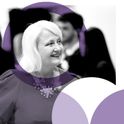I had trouble getting to sleep the other night. I'm usually the most complacent of sleepers. On this night, it started off well enough: I quickly drifted into that episode the scientists call hypnagogic sleep—the borderline between alertness and slumber, where images, shapes, words lift unbidden into the relaxing mind—before it all went wrong. Concerns of the day stamped back into my mind like a gang of thugs jeering their way into a yoga meditation retreat. Sleep became utterly unavailable. I disapprove of sleeping pills, because they reduce dreaming. So at moments such as these, I look for something so dull that I might be bored into sleep. I tried remembering the name of every child in my class in the first year of secondary school. Puzzling over whether it was really Nathan Hunt who sat next to Alfred Jesudasen, I achieved sleep, albeit fitfully. The last name I remember thinking about, one which did not belong to a member of Class 1Q, was that of Michael Corke.
The most poignant part of Wellcome Collection's current exhibition "Sleeping and Dreaming" is the shadowy corner devoted to the disintegration and death of Michael Corke. Corke was a music teacher from Chicago who carried the rare gene for fatal familial insomnia. He died in 1993 at the age of 42, having not slept for six months. Corke's horrifying decline is captured in home movie footage of the ancient-before-his-time conductor at the podium, and then in hospital, eyes empty and wandering, entirely unmoored from the world around him.
Even Gilgamesh, the first great epic hero, couldn't manage to stay awake for six days and seven nights without succumbing to sleep. But when doctors pumped enough sedative into Michael Corke to send him into a coma, his brain activity still showed no signs of sleep. He died from a neurological degeneration of the thalamus, similar to BSE or scrapie.
Sleep itself used to be seen as a kind of death—Homer's "twin brethren, Sleep and Death," Chandler's The Big Sleep, even the Christian "eternal rest." Anyone with children has watched an infant fight terrified against going to sleep. There is a vestigial self-protective instinct at work, our vulnerability while asleep to attack from animals or other humans. And the loss of control as sleep encroaches can feel like a step towards death. But death is extinction, and sleep isn't even oblivion.

What Emerson described as the "strange entertainment" of dreams occurs in all five stages of sleep, but it is those during REM that are the most complex and have all the quality of lived experience. (Contrary to what the psychoanalysts say, dreams have no meaning in themselves or in association to anything outside of themselves: a cigar is just a cigar.)
Between a half and third of our living space is given over to supporting sleep, while the average Briton sleeps for less than a third of the day (a little less than eight hours, between, statisticians say, 11.12pm and 6.53am).
Sleep is a separate realm, with its own rules and customs and, I'm beginning to realise, it is where the important business of life takes place. We should feel sympathy for those who pride themselves on their ability to eschew all but a little sleep. Thomas Edison slept for three to four hours a night, and regretted even those: "Sleep is an acquired habit. Cells don't sleep. Fish swim in the water all night. Even a horse doesn't sleep." Margaret Thatcher was famously contemptuous of anybody who needed more than four hours' sleep on a regular basis.
More impressive and worthy of emulation is Epimenides the Wise. When Epimenides was a boy in Crete, he was sent out by his father to find a lost sheep. Taking shelter in a cave from the midday sun, he slept for 57 years. He woke up wise.
Walter Benjamin mistakenly wrote, "The dream waits secretly for the awakening." It is, of course, the other way around. IB Singer got it right in his story "The Letter Writer," when he wrote: "Herman had often thought that one's true life was lived during sleep. Waking was no more than a marginal time assigned for doing things."
The morning after my insomnia, my wife asked me how I'd slept. I told her I'd become a convert to Herman's sleep philosophy. She contemplated it. "That's interesting," she said, "but it means that people are very alone." That's to be regretted, I suppose, but we should be strong-minded enough to move beyond merely sentimental objections. I was thinking of arguing further that the purpose of marriage is not breeding or love or companionship, but the making of an arrangement for someone to look after us when we're most vulnerable, to watch our backs, as it were, while we're asleep; but a warning look in her eyes ended the conversation. And I kept to myself the story of the Frenchman who, when asked why he had murdered his wife, candidly replied, "She woke me up so I killed her."
Far from it being the purpose of sleep to support and nourish life, the purpose of life is to sleep. All we require from "life" is nutrition, a protected place, and remembered images and feelings to make dreams.
"Sleeping and Dreaming" runs at Wellcome Collection, 183 Euston Road, London NW1 2BE until 9th March










